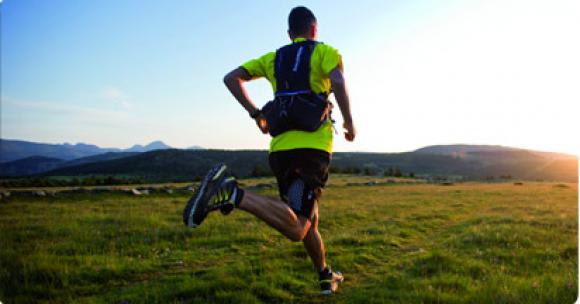

HOW YOUR BODY WORKS
Just like a car, your body is a machine that needs fluids to operate efficiently. In fact, your body is more than 60% water, and even light exercise can deplete that percentage. No fluid means no function, and suddenly it's you stranded on the trail with an overtaxed body. This loss of fluid is called dehydration. And hydrating, or adding fluids, is the key to keeping it from happening to you.
THE BENEFITS OF STAYING WELL HYDRATED
- More energy, power and endurance
- Stay cooler, feel better
- Go farther, faster
- Work harder, burn more calories
- Decrease your recovery time so you can go out and do it all again
HOW DO YOU KNOW WHEN YOU'RE DEHYDRATED?
Once you've reached the point of feeling thirsty, dehydration has already begun. If left this way, the body will continue to provide signs that it is running low. Early signs include a dry mouth and a decrease in energy. These can quickly lead to cramps, headaches and nausea.
TELL ME THE CURE
The cure to all this unpleasantness is as close as a glass of water. Experts recommend the following to make sure you are well hydrated while exercising:
- Drink early — about 2 hours before exercise.
- Drink often—continually sip fluids rather than gulp them down infrequently.
- Add sport/energy drinks — they help restore carbohydrates and electrolytes.
- Drink after—post-exercise hydration gets your fluid levels back to normal and can help with recovery.
- Use the "copious and clear" rule—this refers to urine volume and color when you're drinking enough fluids. Darker color and less volume is an indication that you're dehydrated.
- Finally, make sure your fluids are close at hand. When you're 2 miles into a hike, your water bottle is not much good to you sitting in your car
These tips will help you stay hydrated, and help you incorporating good habits and precautions to you daily lifestyle.

IS IT POSSIBLE TO OVER-HYDRATE?
Too much of a good thing, even water, can have negative side effects. The flip-side to dehydration is over-hydration, or hyponatremia. This is a fairly rare condition which mainly affects endurance athletes such as marathon runners and triathletes. In hyponatremia, sodium levels in the blood become so diluted that cell function becomes impaired. In extreme cases, hyponatremia may cause coma and even death.
THE SOLUTION TO THIS DILUTION?
- Try not to drink more than you sweat.
- Keep your salt levels balanced by drinking a sports drink with electrolytes instead of plain water and/or eating a salty snack such as pretzels.
- Drink while you're exercising and you'll be less likely to drink too much.
- You can test your water intake by weighing yourself before and after intense physical activity. You should weigh about the same. If you have gained weight, you are probably drinking too much water.

